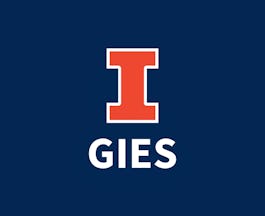Filter by
The language used throughout the course, in both instruction and assessments.
Choose the Banking Course That Aligns Best With Your Educational Goals
 Status: Free
Status: FreeYale University
Skills you'll gain: Finance, Investment Management, Risk Management, Banking, Behavioral Economics, Critical Thinking, Decision Making, Innovation, Regulations and Compliance, Underwriting, Leadership and Management

Columbia University
Skills you'll gain: Banking, Finance

University of Illinois at Urbana-Champaign
Skills you'll gain: Accounting, Banking, Finance, Financial Analysis, Leadership and Management, Financial Accounting, Financial Management, Investment Management, Risk Management, Securities Trading

University of Pennsylvania
Skills you'll gain: Accounting, Finance, Financial Accounting, General Accounting, Financial Analysis, Generally Accepted Accounting Principles (GAAP), Accounts Payable and Receivable, Cost Accounting, Account Management, Cash Management, Decision Making, Investment Management, Taxes, Budget Management, Estimation, Management Accounting, Problem Solving, Business Analysis, Mathematical Theory & Analysis, Mathematics, Entrepreneurship, Strategy and Operations

University of Michigan
Skills you'll gain: FinTech, Finance, Payments, Innovation

University of Geneva
Skills you'll gain: Finance, Investment Management, Leadership and Management, Financial Analysis, Risk Management, Financial Management, Market Analysis, Strategy, Decision Making, Behavioral Economics, Correlation And Dependence, Market Research, Performance Management, Probability & Statistics, Securities Trading, Business Psychology, Mathematical Theory & Analysis, Banking, Statistical Analysis, Accounting

University of Pennsylvania
Skills you'll gain: Finance, Business Analysis, Data Analysis, Financial Analysis, Accounting, Forecasting, Financial Management, General Accounting, General Statistics, Statistical Analysis, Financial Accounting, Mathematical Theory & Analysis, Accounts Payable and Receivable, Probability & Statistics, Basic Descriptive Statistics, Cost Accounting, Data Model, Decision Making, Regression, Management Accounting, Statistical Tests, Strategy and Operations, Budget Management, Microsoft Excel, Spreadsheet Software, Leadership and Management, Probability Distribution, Entrepreneurship, Linear Algebra, Computer Programming

University of California, Irvine
Skills you'll gain: Accounting, Adaptability, Business Analysis, Finance, Financial Analysis, Generally Accepted Accounting Principles (GAAP), Cost Accounting, Financial Accounting, General Accounting, Operational Analysis

IESE Business School
Skills you'll gain: Accounting, Financial Accounting, Finance
 Status: Free
Status: FreeDuke University
Skills you'll gain: Behavioral Economics, Business Psychology, Critical Thinking, Decision Making, Finance, Investment Management, People Analysis, Probability & Statistics, Problem Solving, Strategy

University of Illinois at Urbana-Champaign
Skills you'll gain: Mergers & Acquisitions, Finance, Accounting, Financial Analysis, Financial Accounting, Banking, Business Analysis, Investment Management, Financial Management, Data Analysis, Market Analysis, Corporate Accouting, Taxes

Copenhagen Business School
Skills you'll gain: FinTech, Finance, Innovation, Banking, Business Transformation, Leadership and Management, Payments, Regulations and Compliance, Strategy, Strategy and Operations, BlockChain, Business Analysis, Business Development, Cash Management, Cross Platform Development, Decision Making, Entrepreneurship, Network Analysis, Research and Design, Risk Management
Searches related to banking
In summary, here are 10 of our most popular banking courses
- Financial Markets: Yale University
- Economics of Money and Banking: Columbia University
- Banking and Financial Institutions: University of Illinois at Urbana-Champaign
- Introduction to Finance and Accounting: University of Pennsylvania
- The Future of Payment Technologies: University of Michigan
- Investment Management: University of Geneva
- Finance & Quantitative Modeling for Analysts: University of Pennsylvania
- Finance for Non-Financial Professionals: University of California, Irvine
- Accounting: Principles of Financial Accounting: IESE Business School
- Behavioral Finance: Duke University










